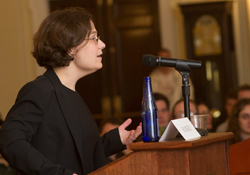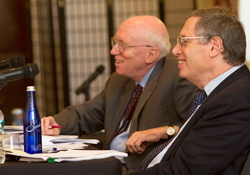Epstein, Hills, Sharkey, and Judge Robert Smith weigh in on National Meat v. Harris (VIDEO)
Hills and Sharkey spar over the pending Supreme Court case National Meat Association v. Harris (VIDEO)
The NYU Student Animal Legal Defense Fund’s October 28 moot court of a pending Supreme Court case featured a cast of legal powerhouses. Roderick Hills Jr., William T. Comfort, III Professor of Law, and Professor Catherine Sharkey argued the case before moot judges Robert Smith of the New York Court of Appeals and Richard Epstein, Laurence A. Tisch Professor of Law.
In National Meat Association v. Harris, the trade association is suing California over its law banning the slaughter and inhumane treatment of non-ambulatory animals in federally regulated slaughterhouses. The organization contends that the Federal Meat Inspection Act preempts the California penal code, which requires slaughterhouses to immediately euthanize a non-ambulatory animal, in conflict with the federal regulation that requires slaughterhouses to hold non-ambulatory animals for observation to identify evidence of disease.
 Arguing for the petitioner, Hills acknowledged that a state can regulate outside a slaughterhouse, while federal law kicks in once animals go inside. But he also pointed to an agency directive indicating that animals lined up outside a slaughterhouse also fall under federal regulation: “That is where the federal statute preempts state law.”
Arguing for the petitioner, Hills acknowledged that a state can regulate outside a slaughterhouse, while federal law kicks in once animals go inside. But he also pointed to an agency directive indicating that animals lined up outside a slaughterhouse also fall under federal regulation: “That is where the federal statute preempts state law.”
Expanding on his point, Hills said, “If your concern is the humane movement of animals, it’s extremely difficult...to regulate the movement to point Y unless you have some capacity to monitor the item being moved at point X where it begins. It would be very difficult for these meat inspectors to figure out who’s non-ambulatory unless they can look at the animals before they start moving.”
As far as enacting a law about non-ambulatory animals, he said, regulating a certain type of animal meant regulating—or interfering with—the operations of a slaughterhouse: “If you define the type in terms of an inspectable condition of the animal, you are essentially saying that you are going to create a duplicate system of inspection.... For the states to define a type of animal in terms of the very ailment over which the feds have exclusive jurisdiction is to circumvent preemption through a pretext.”
 Representing the respondent, Sharkey asserted that “the federal interest here is quite narrowly targeted. States have the prerogative to regulate, if they so choose, anything going on with respect to animals on farms and as a general matter, and the federal government has no interest at the present time in doing so.”
Representing the respondent, Sharkey asserted that “the federal interest here is quite narrowly targeted. States have the prerogative to regulate, if they so choose, anything going on with respect to animals on farms and as a general matter, and the federal government has no interest at the present time in doing so.”
While conceding that the federal scheme for inspection and handling of animals goes beyond an interest in adulterated meat to include humane handling of animals, Sharkey made the distinction that federal regulation specifically concerned animals being offered for slaughter: “They’re trying to get at the whole chain of distribution.”
Sharkey engaged in a spirited exchange with Epstein as he questioned her from the bench. “I do think it’s critical,” she said, “that there’s nothing in the Federal Meat Inspection Act that demands or requires the slaughter of any animals. That’s clear. So you’re trying to read that into the statute through this provision, and I think it’s an incorrect statutory interpretation.”
When Epstein suggested that a collateral purpose of the Federal Meat Inspection Act was to gain postmortem information about animal disease, Sharkey vigorously disagreed: “It’s an incidental benefit, I’ll give you that. But it seems absurd to me, especially in a provision that directly references the secretary and what the secretary has discretion to do, to say that we’re going to then be blind to how the secretary has interpreted it.... If the federal interest is targeted at animals offered for slaughter, then there’s a wide berth for states to define protections based on moral or other considerations.”
 Smith and Epstein deliberated publicly through open microphones for the audience. Epstein initially felt the inclination to reverse the ruling of the U.S. Court of Appeals for the Ninth Circuit, which found that the Federal Meat Inspection Act did not expressly preempt the California statute, and that, while the trade association might win on the merits of the case, it had not demonstrated irreparable harm.
Smith and Epstein deliberated publicly through open microphones for the audience. Epstein initially felt the inclination to reverse the ruling of the U.S. Court of Appeals for the Ninth Circuit, which found that the Federal Meat Inspection Act did not expressly preempt the California statute, and that, while the trade association might win on the merits of the case, it had not demonstrated irreparable harm.
“I think there’s been a radically different tradition,” Epstein said, “between the preemption of private rights of action on the one hand, and state administrative schemes on the other. There’s much less deference to the state administrative schemes than there is with respect to the private rights of action, because the danger of inconsistent overlay by administrative directives is much greater.”
For his part, Smith observed that “there is a somewhat larger state interest and more federal deference to the state interest in the humanitarian side of it, maybe because uniformity doesn’t seem so obviously important.”
Smith added, “It’s a close case. If it’s a pure ethical problem like we don’t kill horses, that’s an easy case, and if it’s a pure health problem like we’re going to inspect for mad cow disease, that’s easy the other way. I’m not quite sure whether a non-ambulatory pig is more like a mad cow or a horse.”
Ultimately, while the moot judges stopped short of a firm ruling, they each expressed the expectation that the Supreme Court would uphold the lower court's ruling. “My guess is it will be affirmed,” said Epstein. “I would affirm it and I would go to bed feeling very uneasy about the decision.”
Watch the full video of the event (1 hr, 32 min):

